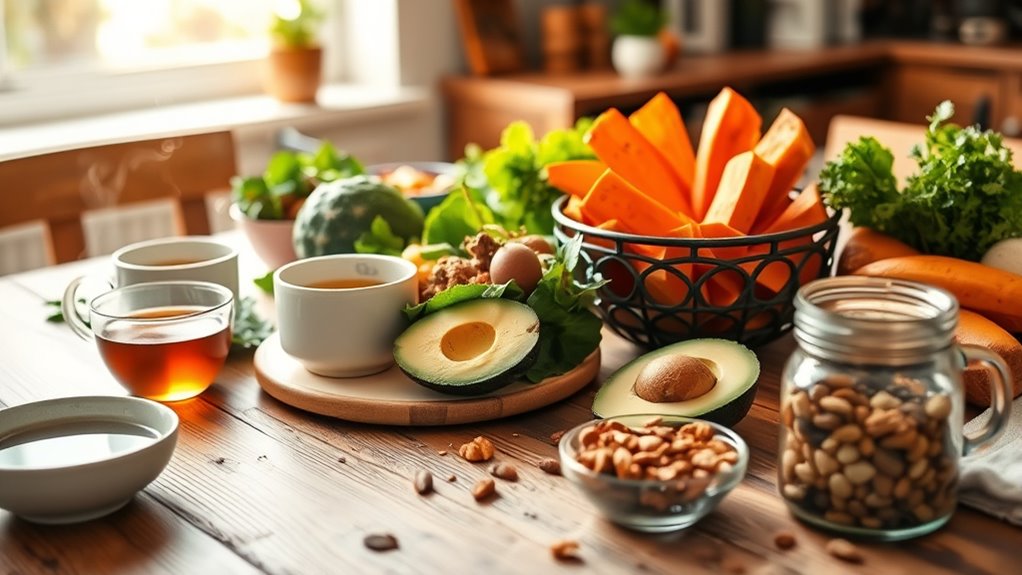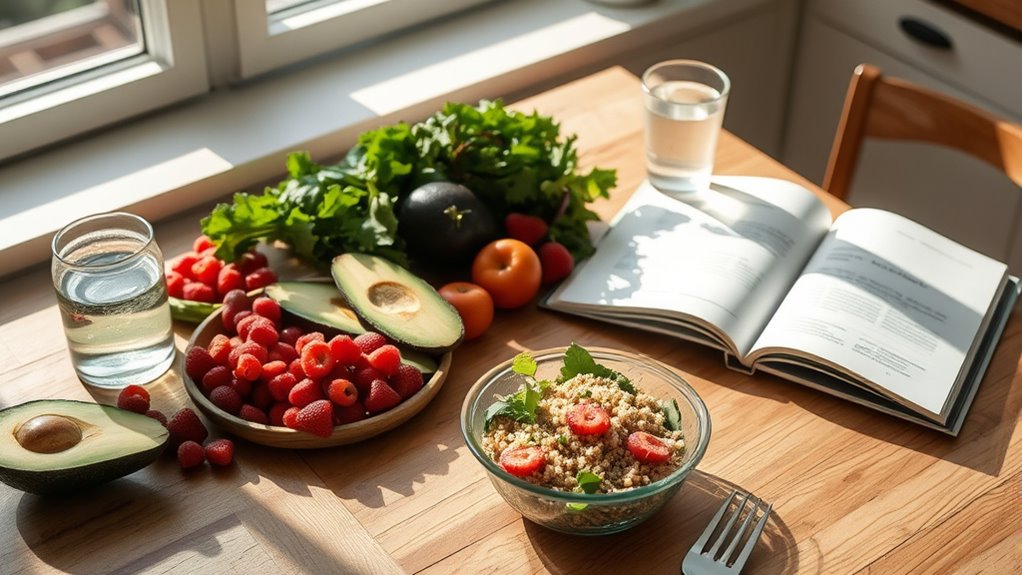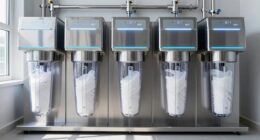Nutrition is essential for your recovery as a new mom. You need around 2,500 calories daily, especially if you’re breastfeeding, to fuel energy and support milk production. Focus on nutrient-rich foods like lean proteins, whole grains, and colorful fruits and veggies to enhance your healing. Don’t forget hydration, as it aids milk supply and boosts energy. By making smart choices, you’ll not only recover faster but also support your overall well-being. There’s so much more to explore about this journey!
Key Takeaways
- Prioritize a balanced diet rich in protein, whole grains, fruits, and vegetables to support recovery and energy levels while breastfeeding.
- Ensure adequate hydration by drinking water and consuming hydrating foods to boost energy and maintain milk supply.
- Incorporate essential nutrients like iron, vitamin D, and omega-3 fatty acids to enhance recovery and mental health postpartum.
- Aim for 2,500 calories daily, adjusting intake based on activity level and breastfeeding needs to support energy and weight loss.
- Include quick, nutritious snacks like fresh fruits and yogurt to stabilize energy levels throughout the day.

Nature Made Postnatal Multivitamin + DHA 200 mg, Postnatal Vitamins for Women, Includes Iron, Vitamin D3, Calcium, Iodine & More for Breastfeeding Moms, 60 Softgels
60-DAY SUPPLY, ONE DAILY SOFTGEL: Adults take 1 softgel daily with water and a meal. Each serving (1…
As an affiliate, we earn on qualifying purchases.
As an affiliate, we earn on qualifying purchases.
Understanding Your Caloric Needs

How do you know if you’re meeting your caloric needs as a new mom? If you’re breastfeeding, your daily caloric intake should be around 2,500 calories, which includes an additional 450 to 500 calories to support milk production and your energy levels.
Your baseline needs change based on your activity level; sedentary women need about 1,800 to 2,000 calories, while active women might require up to 2,400 calories.
Your daily caloric needs vary with activity level; sedentary women need 1,800-2,000 calories, while active women may need up to 2,400.
Factors like age, body mass index (BMI), and whether you’re exclusively breastfeeding can also influence your caloric needs.
To guarantee you’re fueling your body properly, focus on nutrient-dense foods and consult with your healthcare provider for personalized recommendations.
Staying mindful of your caloric intake helps you maintain your health and energy during this demanding time.

Nature Made Postnatal Multivitamin + DHA 200 mg, Postnatal Vitamins for Women, Includes Iron, Vitamin D3, Calcium, Iodine & More for Breastfeeding Moms, 60 Softgels
60-DAY SUPPLY, ONE DAILY SOFTGEL: Adults take 1 softgel daily with water and a meal. Each serving (1…
As an affiliate, we earn on qualifying purchases.
As an affiliate, we earn on qualifying purchases.
Essential Nutrients for Recovery

As you recover from childbirth, focusing on essential nutrients can greatly enhance your healing and well-being.
Iron is critical for combating postpartum anemia, while vitamin D supports your bone health and immune function. Omega-3 fatty acids, found in foods like salmon and flaxseeds, promote brain health and reduce inflammation, and incorporating foods high in chia seeds can also provide these beneficial fats. Additionally, maintaining a balanced budget for nutrient-rich foods can help ensure you get the necessary ingredients for your recovery. Including omega-3 rich foods like chia seeds can further aid in reducing inflammation and supporting overall health during this critical time.
Calcium is fundamental for strong bones and muscle function, especially if you’re breastfeeding. B vitamins, particularly B12, are significant for energy production and help fight fatigue. Additionally, it’s important to be aware of common symptoms of any health issues that may arise during recovery.
Incorporating these nutrients into your diet won’t only support your physical recovery but also improve your overall mood and energy levels. Prioritize these essentials to empower your journey through postpartum recovery.

Nordic Naturals Postnatal Omega-3, Lemon – 60 Soft Gels – 1120 Total Omega-3 + 1000 IU Vitamin D3 – Formulated for New Moms; Supports Optimal Wellness, Positive Mood, Healthy Metabolism – 30 Servings
AWARD-WINNING POSTNATAL VITAMINS – Postnatal Omega-3 won the Women’s Essentials Award from “Taste for Life,” the Best of…
As an affiliate, we earn on qualifying purchases.
As an affiliate, we earn on qualifying purchases.
Smart Food Choices for New Moms

When you’re managing the demands of new motherhood, making smart food choices can greatly impact your energy levels and overall well-being.
Focus on protein-rich options like lean beef, eggs, and legumes to fuel your body. Incorporating whole grains such as brown rice and oatmeal provides sustained energy throughout your busy days.
Don’t forget to load up on fresh fruits and vegetables; oranges and leafy greens are excellent for vitamins and minerals.
Healthy fats are essential too, so consider salmon, avocados, and nuts to support your mood and recovery.
Finally, include dairy or fortified plant-based alternatives for calcium. Additionally, incorporating celery juice can provide hydration and essential nutrients that benefit both you and your baby.
These choices not only nourish you but also contribute to your baby’s health as well.

Munchkin® Milkmakers® Lactation Cheddar Crisps for Breastfeeding Moms with Oats and Flax, 6 Count
Made with ingredients traditionally used to support breast milk supply, like oats and flax seed
As an affiliate, we earn on qualifying purchases.
As an affiliate, we earn on qualifying purchases.
Importance of Hydration

Water enhances tissue repair, especially after childbirth or surgeries like C-sections, and helps reduce postpartum swelling. It also smooths digestion, preventing constipation, and boosts your energy by about 14%, which is essential when you’re feeling fatigued. If you’re breastfeeding, hydration is critical for maintaining your milk supply, as breast milk is about 80-90% water. Dehydration can cause a dip in milk production and impact your baby’s nourishment. Make it a habit to drink water throughout the day, and include hydrating foods like fruits and vegetables to support your overall health and well-being. Additionally, relaxation before sleep can further enhance your recovery and overall well-being during this time. Staying hydrated can also aid in reducing uric acid levels, which is beneficial for overall health. Drinking enough water supports cognitive function, which can help new moms stay focused and alert as they care for their newborns. Incorporating juice cleanses can also provide a concentrated source of vitamins and antioxidants to aid in recovery.
Nutrition’s Role in Mental Health

Nutrition plays an essential role in shaping your mental health during the postpartum period. Iron deficiency can increase your risk of postpartum depression, so make sure you’re getting enough. A raw food diet, which emphasizes whole, unprocessed foods, can also provide essential nutrients that support mental health.
Omega-3 fatty acids, found in fish and flaxseeds, are vital too, as low levels correlate with higher depressive symptoms. Don’t overlook vitamin D; maintaining adequate levels can help stabilize your mood.
A balanced diet, rich in whole, minimally-processed foods, supports overall well-being. Incorporating B vitamins, magnesium, and folate can enhance mood and reduce anxiety. Aim for stable blood sugar by pairing carbs with protein and healthy fats. By prioritizing these nutrients, you can positively influence your mental health as you navigate motherhood. Additionally, foods rich in antioxidants from honey can further support your mental well-being and help combat oxidative stress.
Supporting Physical Recovery Through Diet

As you navigate the postpartum period, supporting your physical recovery through diet is essential.
Focus on a balanced diet rich in whole foods, lean proteins, healthy fats, fruits, and vegetables. Aim for 8-10 glasses of water daily, increasing to 12-14 if you’re breastfeeding. Including chia seeds in your diet can help promote bowel regularity and enhance digestive health. Additionally, incorporating aloe vera juice may provide digestive benefits and support your overall wellness. Chia seeds are also rich in antioxidants, which can help combat oxidative stress during recovery.
A balanced diet of whole foods and hydration is key for postpartum recovery, especially when breastfeeding.
High-protein foods are vital for healing and milk production. Don’t forget calcium and iron to support bone health and prevent anemia.
Limit processed foods high in sugar and sodium to promote healing. Include nutrient-dense options like leafy greens, berries, fatty fish, nuts, and quinoa. Emphasize fiber-rich foods for digestive health and consider probiotic-rich options for gut support. Incorporating nutrient-dense options such as beetroot can also enhance your diet and support overall recovery.
Prioritizing these dietary choices will help you recover effectively and feel your best.
Gradual Weight Loss Strategies

Losing weight after giving birth can feel overwhelming, but focusing on gradual changes is key to achieving lasting results. Aim to lose 1-2 pounds per week for sustainable success. Prioritize balanced meals, incorporating whole grains, lean proteins, fruits, and vegetables to guarantee you’re getting the nutrients you need. Including low carb high protein breakfast ideas can help you start your day with energy while supporting weight loss. Stay hydrated by drinking 12-14 glasses of water daily, especially if you’re breastfeeding. Including green juice can provide essential nutrients and support your overall wellness during recovery. It’s also beneficial to consider retirement savings options for self-employed individuals to ensure financial stability as you adjust to new motherhood. Start with light exercises like walking, gradually increasing the intensity as you feel comfortable. Avoid restrictive diets; instead, focus on whole foods and practice mindful eating with smaller, frequent meals. Including juices like beet juice can also support your overall wellness and aid in your recovery process.
Boosting Energy Levels With Nutrition

After focusing on gradual weight loss strategies, it’s important to contemplate how the right foods can help you maintain your energy levels during this busy time.
Incorporate nutrient-dense options like salmon, eggs, and whole grains into your meals for sustained energy. Lean meats provide essential iron and protein, vital for both energy and breastfeeding. Consider adding dishes like Turkey Bean and Tomato Zoodle Bowl to your meal rotation for a quick, nutrient-rich option. Including a variety of colors on your plate can further enhance nutrient diversity and energy.
Don’t forget your greens; leafy vegetables are packed with vitamins that support overall health. Staying hydrated is key, too—drink plenty of water, and consider herbal teas or electrolyte drinks for an extra boost.
Quick snacks like fresh fruits, nut butters, and yogurt can help keep your energy stable throughout the day. Prioritizing these foods will support your recovery and daily demands. Additionally, while enjoying occasional treats, be mindful of choices like ice cream, which can be high in saturated fats and may impact your overall health.
The Impact of Exercise on Nutritional Needs

Exercise plays an essential role in shaping your nutritional needs as a new mom. Engaging in physical activity boosts your energy expenditure, which can increase your caloric needs.
Higher-intensity workouts demand even more fuel, so it’s crucial to adjust your intake accordingly. If you’re breastfeeding, make sure you consume enough calories to support milk production.
Prioritize protein for muscle repair, complex carbohydrates for energy, and healthy fats for sustained vitality. Hydration is key, too, as it supports both exercise and overall health.
Remember that regular activity can enhance digestion and appetite regulation, making it easier to maintain a balanced diet. By meeting these nutritional demands, you’ll support your recovery and well-being.
Frequently Asked Questions
Can I Skip Meals if I’m Not Hungry?
You might think skipping meals is okay if you’re not hungry, but it can lead to more issues than you realize.
Your body needs regular fuel to maintain energy, mood, and overall health, so skipping meals can actually make you feel worse later.
Instead, try eating small snacks throughout the day. This way, you’ll keep your energy up and avoid nutritional deficiencies, which can impact your well-being over time.
What Snacks Are Best for Nighttime Cravings?
When nighttime cravings hit, you’ve got some tasty options to satisfy those urges.
Try snacking on nuts for a protein and healthy fat boost, or indulge in fruit with curd for something sweet yet nutritious.
Popcorn can be a low-calorie choice if you skip the butter.
Homemade energy balls made from nuts and seeds are great, and you can’t go wrong with a hard-boiled egg for a quick protein fix.
How Can I Manage Food Allergies While Breastfeeding?
To manage food allergies while breastfeeding, start by monitoring your infant for any allergic reactions like rashes or vomiting.
Keep a food journal to track what you eat and any symptoms. If you suspect an allergen, consider an elimination diet, removing common triggers like dairy or nuts.
Always consult your healthcare provider for personalized guidance.
Are There Any Foods I Should Avoid While Breastfeeding?
You can’t have your cake and eat it too when it comes to breastfeeding.
It’s wise to avoid caffeine, mercury-rich fish, and gassy foods like cabbage and beans, as they may upset your baby’s tummy.
Limit alcohol and watch out for common allergens, like dairy and soy, which can cause reactions.
Staying hydrated and focusing on a diverse diet will help you and your baby thrive during this special time.
How Do I Handle Stress Eating During Postpartum?
To handle stress eating during postpartum, start by identifying your emotional triggers.
Practice mindful eating, focusing on what you’re consuming and how it makes you feel.
Build a support network to share your experiences and feelings.
Prioritize self-care activities, like gentle exercise or relaxation techniques, to reduce stress levels.
Incorporate a balanced diet with whole foods and stay hydrated.
Conclusion
So, as you sip your kale smoothie while balancing a baby on one hip and a laundry basket on the other, remember: fueling your recovery is no joke. You’re not just a mom; you’re a superhero in sweatpants. Embrace those essential nutrients like they’re your sidekicks, hydrating like a camel at a buffet, and ditch the guilt. You can conquer the world—or at least the couch—one nutritious bite at a time. Now go, save snack time!









